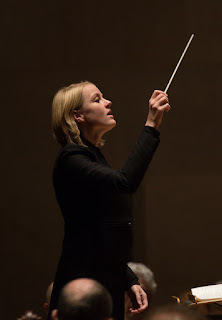'Scheherazade' holds ISO audience in thrall in 'Greetings from the Middle East'
 |
| Ruth Reinhardt impressive in warhorse and exotic pieces |
For all the comfort food Rimsky-Korsakov's "Scheherazade" provides to the appetite for music that stimulates the pictorial imagination, it is also an exhibition of genius in orchestration. The Russian composer wrote a book on that subject, a kind of inside-baseball landmark of the craft he put on public view so often.
The Indianapolis Symphony Orchestra's return to this masterpiece Friday night, under the guidance of guest conductor Ruth Reinhardt, painted its essence in vivid colors. Conspicuous excellence in the solos threaded throughout the 50-minute expanse lifted the Hilbert Circle Theatre performance to the cheering ovation it deserved at the end.
Chief among them, of course, is the concertmaster's impersonation of the title character, the sultana who spins tale after tale to forestall her fated execution by a jealous husband.
In that role, Kevin Lin shone throughout. His initial solo was a blend of Scheherazade's teasing and caution, holding back slightly on forward momentum in recognition of the heroine's precarious prospects for survival. It was loaded with the sultana's cagey blend of trepidation and calculation. That was shadowed effectively in ensemble statements of the melody in "The Sea and Sinbad's Ship."
At length, especially in the second movement, originally titled "The Tale of the Kalendar Prince," one solo or duo turn after another captivated the attention: Ivy Ringel, bassoon! Jennifer Christen, oboe! Robert Danforth, horn! Austin Huntington, cello! Samuel Rothstein, clarinet! Diane Evans, harp! Conrad Jones, trumpet! Karen Moratz, flute! (I've just exhausted my yearly supply of exclamation points, under severe restriction for old writers.)
There are forthright sectional showcases as well, giving a foretaste of a more abstract orchestral showcase to come, Bela Bartok's Concerto for Orchestra. "The Young Prince and the Young Princess" (third movement) was beguiling. The finale, a triptych ("The Festival at Baghdad —The Sea—Shipwreck"), brought percussion virtuosity to the fore. Reinhardt's command of the variety of texture and rhythm seemed both absolute and ingratiating. Brass are vital to conveying the sultan's menacing control as well as, later, the festival zest and the shipwreck episodes that make quite a tone-painting spectacle before the work resumes the gentle "once upon a time" feeling of its opening measures.
 |
| Janna Baty makes her ISO debut this weekend. |
At intermission, Vali explained to me his focus on Olivier Messiaen in the third piece of the otherwise folk-music-based set. The movement was striking in its sepulchral use of percussion, including stopped piano strings, gongs, and soft-spoken chimes; the rest of the orchestra sat silent. Vali admires Messiaen as one of only three spiritual composers in classical-music history. Apart from other aspects of spiritual depth Vali acknowledges in other composers, his small series of spiritual champions begins with J.S. Bach, skips ahead to Anton Bruckner, and ends with the deeply Catholic French composer (1908-1992).
The other pieces in the set reminded me somewhat of other composers. To set a poem in which a lover anticipates the return of his beloved, there was distinctive Mahlerian yearning, with the soloist's melodies outlined by the orchestra. For the exuberant passion of "Song from Luristan," there were touches of the lush infatuation characteristic of Canteloube's "Songs of the Auvergne." In the finale, "Popular Song from Tehran," the influence of Bartok could be discerned, especially in how the angular melody was handled in accompaniment. This may seem to suggest an excessively derivative composer, but the beneficent shadows of other music aptly dappled what struck me as a shrewdly judged, personalized canvas.
Avner Dorman's "Azerbaijani Dance" opened the concert (as it will this afternoon's identical program repeat) with a hard-charging display of foot-stomping energy. Despite the overriding pulse, there was evident complication of the rhythmic profile that the ISO seemed to have under control. Amid the roars and smears that varied the texture, there were also interesting reprieves by intense, but softer, passages of treble sounds, including muted trumpets.
The new experiences afforded by the program's first half enabled "Greetings from the Middle East" to give an authentically exotic flavor to the ISO's season-long "postcard" series. That helped the familiar "Scheherazade" sound fresher than ever.



Comments
Post a Comment